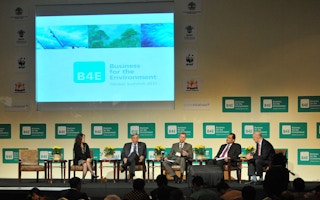Patience is needed in the struggle to balance business profits with sustainability, said business leaders, even as critics demand urgent action from firms to protect the world’s natural resources.
“I know it’s going to be a long and winding road to reach the ultimate goal, but at least we can get a head start on what we think is best for the future, the country and the environment,” said Peter Chambers, managing director of strategy and governance for the Rajawali Group, one of Indonesia’s largest business conglomerates.
He was speaking to a group of over 700 business leaders, NGO representatives and government officials at this week’s Business for the Environment Summit in Jakarta.
Businesses are also considering the dangers of delaying action on sustainability to their bottom line as well as to the environment. “We must be mindful of the recent threats to our exports if Indonesia is perceived as using unsustainable practices,” said Mr Chambers.
Several of Indonesia’s industries have come under fire recently for environmentally and socially damaging business practices, most notably the palm oil industry, which saw its companies losing multinational clients such as Unilever and Burger King.
Mr Chambers said Indonesia’s companies, specifically its agribusinesses, needed to commit to three primary goals for sustainable development: to comply with regulations on forestry and mining operations; to achieve and sustain positive images as suppliers; and to contribute to solutions for outstanding land tenure issues.
In turn, he urged the government to provide clear rules and regulations for businesses, provide better enforcement of those rules and to invest in infrastructure that would help businesses operate more efficiently.
As companies invest in initiatives to become more sustainable where they operate, they may be required to adapt their business methods.
PepsiCo Asia Pacific’s president Umran Beba said that her company has to rethink their timeline for the return on investment for sustainability projects, such as PepsiCo’s intiative to provide three million people with safe drinking water by 2015.
This project is measured and reported in a similar way to the company’s production investments, but Ms Beba said they’ve had to extend their timeline for calculating the return on investments to five or ten years. “These investments are the ones that you have to seal and stamp and don’t touch,” she added.
This is where good leadership comes in, she said.
Patience may not be welcomed by those who desire to see Indonesia transit to a low-carbon economy at a faster pace.
But as Dorjee Sun, chief executive officer of consultancy Carbon Conservation pointed out, the results could be well-worth it.
The pulp and paper industry, for example, has for a long time been seen as an enemy of forests by conservationists. They take forest and turn it into pulp and paper, he said.
Then he asked, “What if they could become the biggest protectors of the forest by doing it in a sustainable way?”
Eco-Business.com’s coverage of the B4E Global Summit 2011 is brought to you by City Developments Ltd (CDL).















